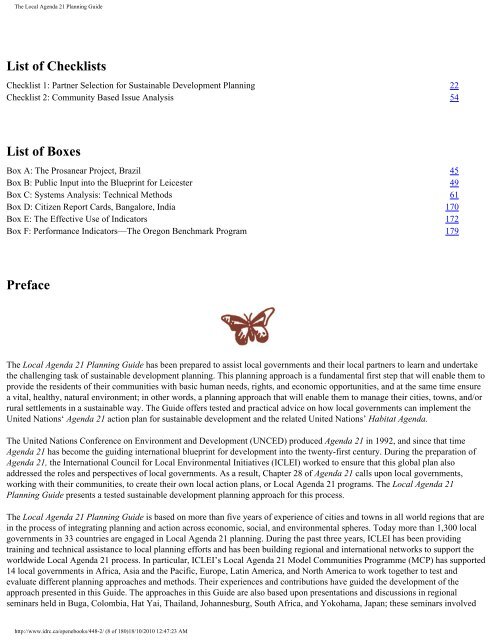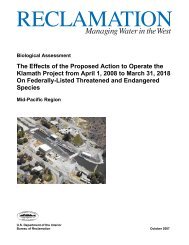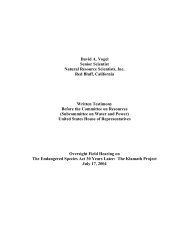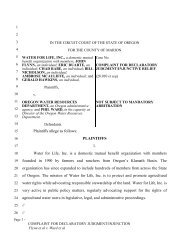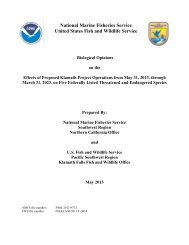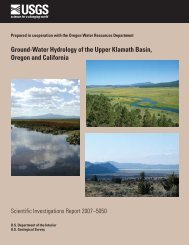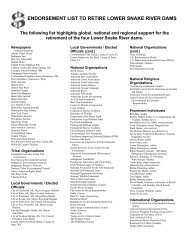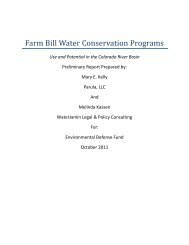The Local Agenda 21 Planning Guide - Democrats Against UN ...
The Local Agenda 21 Planning Guide - Democrats Against UN ...
The Local Agenda 21 Planning Guide - Democrats Against UN ...
You also want an ePaper? Increase the reach of your titles
YUMPU automatically turns print PDFs into web optimized ePapers that Google loves.
<strong>The</strong> <strong>Local</strong> <strong>Agenda</strong> <strong>21</strong> <strong>Planning</strong> <strong>Guide</strong><br />
List of Checklists<br />
Checklist 1: Partner Selection for Sustainable Development <strong>Planning</strong> 22<br />
Checklist 2: Community Based Issue Analysis 54<br />
List of Boxes<br />
Box A: <strong>The</strong> Prosanear Project, Brazil 45<br />
Box B: Public Input into the Blueprint for Leicester 49<br />
Box C: Systems Analysis: Technical Methods 61<br />
Box D: Citizen Report Cards, Bangalore, India 170<br />
Box E: <strong>The</strong> Effective Use of Indicators 172<br />
Box F: Performance Indicators—<strong>The</strong> Oregon Benchmark Program 179<br />
Preface<br />
<strong>The</strong> <strong>Local</strong> <strong>Agenda</strong> <strong>21</strong> <strong>Planning</strong> <strong>Guide</strong> has been prepared to assist local governments and their local partners to learn and undertake<br />
the challenging task of sustainable development planning. This planning approach is a fundamental first step that will enable them to<br />
provide the residents of their communities with basic human needs, rights, and economic opportunities, and at the same time ensure<br />
a vital, healthy, natural environment; in other words, a planning approach that will enable them to manage their cities, towns, and/or<br />
rural settlements in a sustainable way. <strong>The</strong> <strong>Guide</strong> offers tested and practical advice on how local governments can implement the<br />
United Nations‘ <strong>Agenda</strong> <strong>21</strong> action plan for sustainable development and the related United Nations’ Habitat <strong>Agenda</strong>.<br />
<strong>The</strong> United Nations Conference on Environment and Development (<strong>UN</strong>CED) produced <strong>Agenda</strong> <strong>21</strong> in 1992, and since that time<br />
<strong>Agenda</strong> <strong>21</strong> has become the guiding international blueprint for development into the twenty-first century. During the preparation of<br />
<strong>Agenda</strong> <strong>21</strong>, the International Council for <strong>Local</strong> Environmental Initiatives (ICLEI) worked to ensure that this global plan also<br />
addressed the roles and perspectives of local governments. As a result, Chapter 28 of <strong>Agenda</strong> <strong>21</strong> calls upon local governments,<br />
working with their communities, to create their own local action plans, or <strong>Local</strong> <strong>Agenda</strong> <strong>21</strong> programs. <strong>The</strong> <strong>Local</strong> <strong>Agenda</strong> <strong>21</strong><br />
<strong>Planning</strong> <strong>Guide</strong> presents a tested sustainable development planning approach for this process.<br />
<strong>The</strong> <strong>Local</strong> <strong>Agenda</strong> <strong>21</strong> <strong>Planning</strong> <strong>Guide</strong> is based on more than five years of experience of cities and towns in all world regions that are<br />
in the process of integrating planning and action across economic, social, and environmental spheres. Today more than 1,300 local<br />
governments in 33 countries are engaged in <strong>Local</strong> <strong>Agenda</strong> <strong>21</strong> planning. During the past three years, ICLEI has been providing<br />
training and technical assistance to local planning efforts and has been building regional and international networks to support the<br />
worldwide <strong>Local</strong> <strong>Agenda</strong> <strong>21</strong> process. In particular, ICLEI’s <strong>Local</strong> <strong>Agenda</strong> <strong>21</strong> Model Communities Programme (MCP) has supported<br />
14 local governments in Africa, Asia and the Pacific, Europe, Latin America, and North America to work together to test and<br />
evaluate different planning approaches and methods. <strong>The</strong>ir experiences and contributions have guided the development of the<br />
approach presented in this <strong>Guide</strong>. <strong>The</strong> approaches in this <strong>Guide</strong> are also based upon presentations and discussions in regional<br />
seminars held in Buga, Colombia, Hat Yai, Thailand, Johannesburg, South Africa, and Yokohama, Japan; these seminars involved<br />
http://www.idrc.ca/openebooks/448-2/ (8 of 180)18/10/2010 12:47:23 AM


